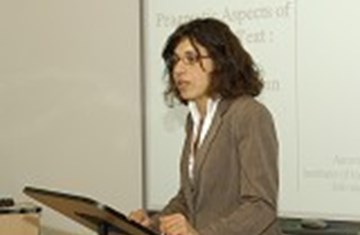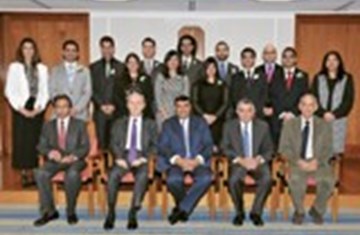New IIS publication on Fatimid Imam-caliph al-Mu‘izz
The Institute of Ismaili Studies is pleased to announce the publication of an English translation of the text on the fourth Fatimid Imam-caliph, al-Mu‘izz li-Din Allah, from Idris Imad al-Din’s 'Uyun al-akhbar'. This book, translated by Dr Shainool Jiwa, has been published under the title, The Founder of Cairo: The Fatimid Imam-Caliph al-Mu‘izz and his Era, Ismaili Texts and Translations Series(2013).
Idris Imad al-Din (d. 872/1468) was the chief da‘i of the Yemeni Tayyibi Ismailis and compiler of Uyun al-akhbar wa funun al-athar (Sound Sources and Trustworthy Traditions), a monumental seven-volume history of the Ismaili Imamat from its beginnings to his own time. Its importance stems from the fact that Imam al-Mu‘izz (who reigned for 22 years from 341/953 to 365/975) was the principal architect of the transformation of the Fatimid state from a regional North African state to an expansive Mediterranean empire. Among his crowning achievements was the peaceful conquest of Egypt in 358/969 and the founding of his new capital city of Cairo.
The translator of this work, Dr Shainool Jiwa, mentions in an interview that Idris ‘Imad al-Din’s text is the only extant Ismaili medieval source we have for the history of this period. Idris uses a range of first-hand primary sources from a large geographical span that was available to him as the chief dai of the Tayyibi community, many of which are now lost to us. As such, Idris’ work represents the most comprehensive account of al-Mu‘izz which is available to us today.
Dr Jiwa notes that one of her motivations in undertaking this project was the fact that it gave her an opportunity for ‘comparative historiographical analysis'. In her previous work, Towards a Shi‘i Mediterranean Empire: Fatimid Egypt and the Founding of Cairo (2009), she examined the reign of al-Mu‘izz from a non-Ismaili perspective of the Egyptian historian Taqi al-Din al-Maqrizi (d. 845/1449), as recounted in his Itti‘az al-hunafa’.
Drawing attention to the fact that both al-Maqrizi and Idris were contemporaries writing about the Fatimid period Dr Jiwa said:
“Al-Maqrizi and Idris were contemporaries, writing about the same period, but they approached their subject from different vantage points and for different purposes. They also wrote for diverse audiences. A close reading of their works provides a rare and rich case study on Muslim historiography. Their works also complement each other in providing a more balanced and nuanced account of the life and times of al-Mu‘izz.”
In this new publication, Dr Jiwa provides the first annotated English translation of the lengthy chapter on al-Mu‘izz from the ‘Uyun, together with a comprehensive introduction to the work. It will particularly appeal to students of Ismaili and Islamic history, Fatimid studies, medieval history of the Mediterranean region, as well as Muslim historiography. It will also provide easier access for scholars to explore this extremely rich source, which includes many historical anecdotes and stories, as well as wonderful examples of Fatimid poetry.






